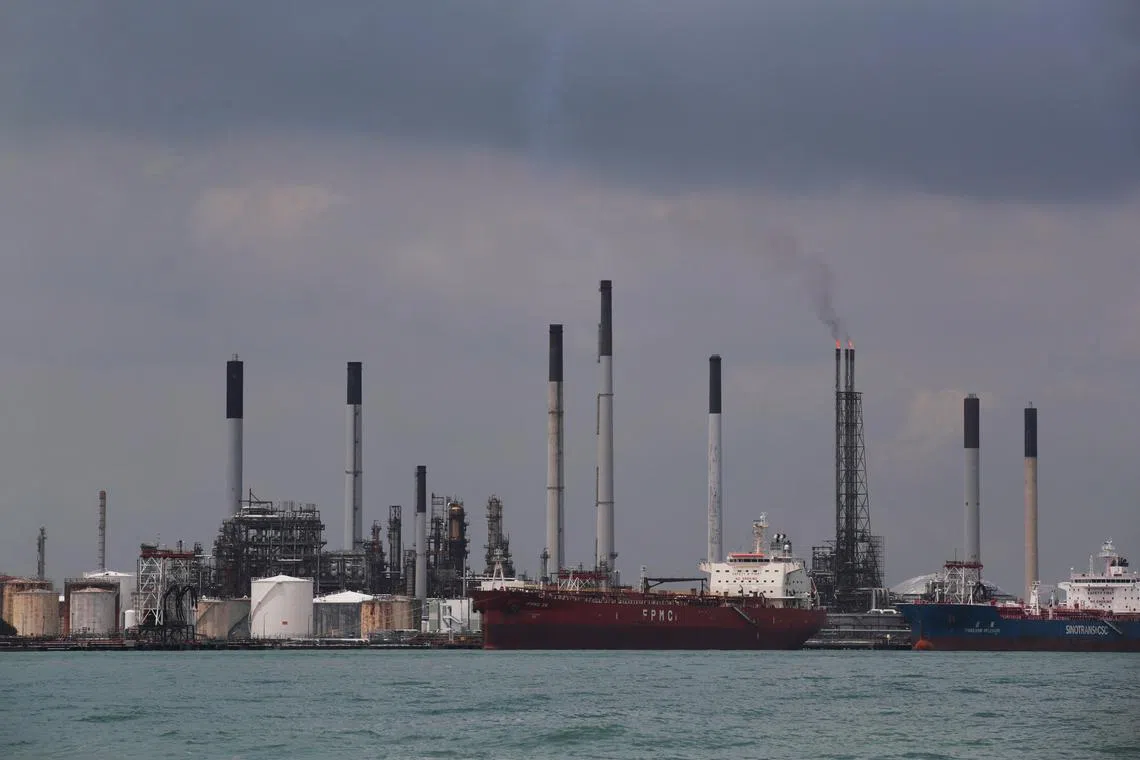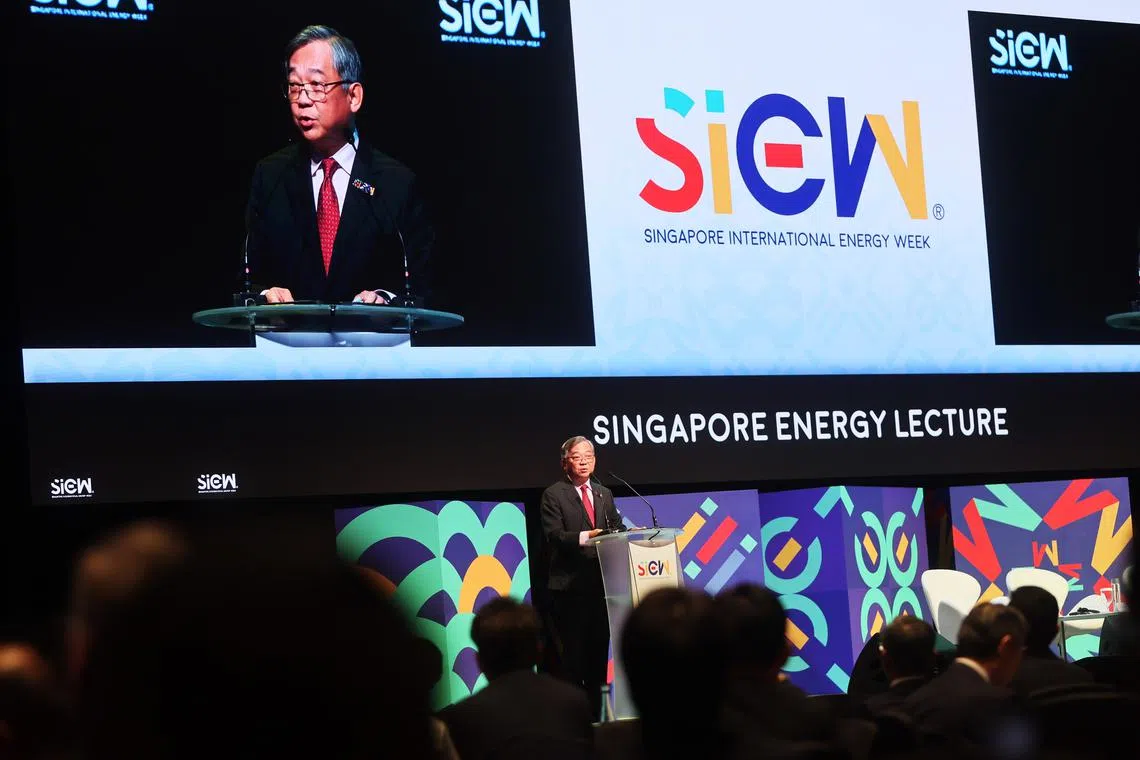Central gas company to be set up by Govt to help ensure stable supply, energy security
Sign up now: Get ST's newsletters delivered to your inbox

The Energy Market Authority intends to set up a central gas company in 2024 and will consult the industry on the details of the centralised gas procurement framework in the coming months.
PHOTO: ST FILE
SINGAPORE – As Singapore is still expected to rely on natural gas for more than half of its power generation needs by 2035, further steps have to be taken to ensure that supply remains sufficient, reliable and competitively priced, said the Energy Market Authority (EMA).
“Natural gas remains central in ensuring Singapore’s energy security beyond the next decade... even with increased renewable energy and electricity imports by 2035, more time is still needed to scale up low-carbon energy sources,” an EMA spokesperson said.
Speaking at the Singapore International Energy Week held at the Sands Expo and Convention Centre on Monday, Minister for Trade and Industry Gan Kim Yong said the Government will be centralising the procurement and supply of gas for the power sector, under a central gas company, by aggregating demand from the generation companies (gencos).
Describing this as a fundamental shift in the country’s gas procurement strategy, Mr Gan said: “We believe that this is necessary to create a more stable and secure power system that will ultimately benefit the consumers and also the gencos themselves.”
Having this “firm foundation” will then allow Singapore to push ahead with its energy transition to cleaner fuels, he said, noting that the Republic has a target of reaching net-zero emissions by 2050.
Natural gas – the cleanest form of fossil fuel that produces the least amount of carbon emissions per unit of electricity, currently powers 95 per cent of Singapore’s electricity needs.
“Getting the power sector to net zero will be a key thrust of this endeavour as power generation contributes to around 40 per cent of Singapore’s carbon emissions,” he added.
Currently, gencos individually decide on the volume and tenure of gas to procure based on commercial considerations, but this does not provide the assurance that Singapore will always have enough gas to meet its needs, especially during a crisis when market conditions are volatile, EMA said.
For instance, during the 2021-2022 global energy crisis, the gencos reduced the volume of their gas contracts when prices were high, which led to large swings in wholesale electricity prices, said the authority.
Many gencos have been reluctant to enter into long-term contracts, which typically offer a greater certainty of delivery and price stability, as they do not want to be exposed to market volatility and uncertainties in the long term.
Singapore gets its natural gas from two sources: piped natural gas from Indonesia and Malaysia, and liquified natural gas (LNG) from a number of countries.
There are currently four licensed importers of LNG: ExxonMobil LNG Asia Pacific, Pavilion Energy Singapore, Sembcorp Fuels (Singapore) and Shell Eastern Trading.
Slightly more than 40 per cent of total gas supply comes from LNG, said Mr Chong Zhi Xin, the director of gas, power and climate solutions at S&P Global Commodity Insights. However, the proportion of LNG supply is expected to increase significantly over the next two years as contracts for piped natural gas with Indonesia are expected to expire soon.
“In addition, global developments and the energy transition are likely to lead to more volatile oil and gas markets, which may further reduce the risk appetites of generation companies,” said EMA.
Under the new framework, should overall demand exceed that indicated by the gencos, the gas company will procure the additional volumes that are needed, EMA said.
The centralised procurement approach will apply to all incremental gas demand from the power sector, including gas contract renewals.
This means that generation companies will still be allowed to continue with the existing gas supply arrangements that they have with their respective suppliers.
Industrial gas customers will not be subject to this central procurement framework and can continue to procure gas through licensed gas importers.
EMA intends to set up the gas company in 2024 and will consult the industry on the details of the centralised gas procurement framework in the coming months.
The new framework will create greater economies of scale that will allow Singapore to negotiate more favourable gas contracting terms, procure it from diverse sources, and enter into longer-term gas contracts to provide more stable prices and supply, said Mr Gan.

Trade and Industry Minister Gan Kim Yong said the new centralised gas procurement framework will create greater economies of scale.
ST PHOTO: KELVIN CHNG
Dr David Broadstock, a senior research fellow and lead of energy transition at the Sustainable and Green Finance Institute at the National University of Singapore, noted that the continued use of natural gas is not an ideal footing for a smooth transition to net zero by 2050.
“This means that the current power generation system can, in principle, support the net-zero transition in its totality, if Singapore can reliably source a scalable supply of green hydrogen in the future,” said Dr Broadstock.
He noted that the centralisation of gas procurement would mean that the Government will, in the short-term, take responsibility for contracting natural gas shortfalls, and take long-term responsibility for all natural gas procurement.
With greater flexibility to lock in long-term supply contracts that will help stabilise longer-term power generation costs, this should, in principle, help to lower domestic electricity costs, said Dr Broadstock.
Mr Chong noted that the gas company would have to balance the trade-offs between maintaining energy security and profitability, and could face higher costs, depending on the regulations imposed by EMA. With the new scheme, power generation companies would likely receive similar pricing terms from the new gas aggregator. With the companies paying similar prices across the board, they would then be able to focus on their core business of improving efficiency to reduce cost, said Mr Chong.



